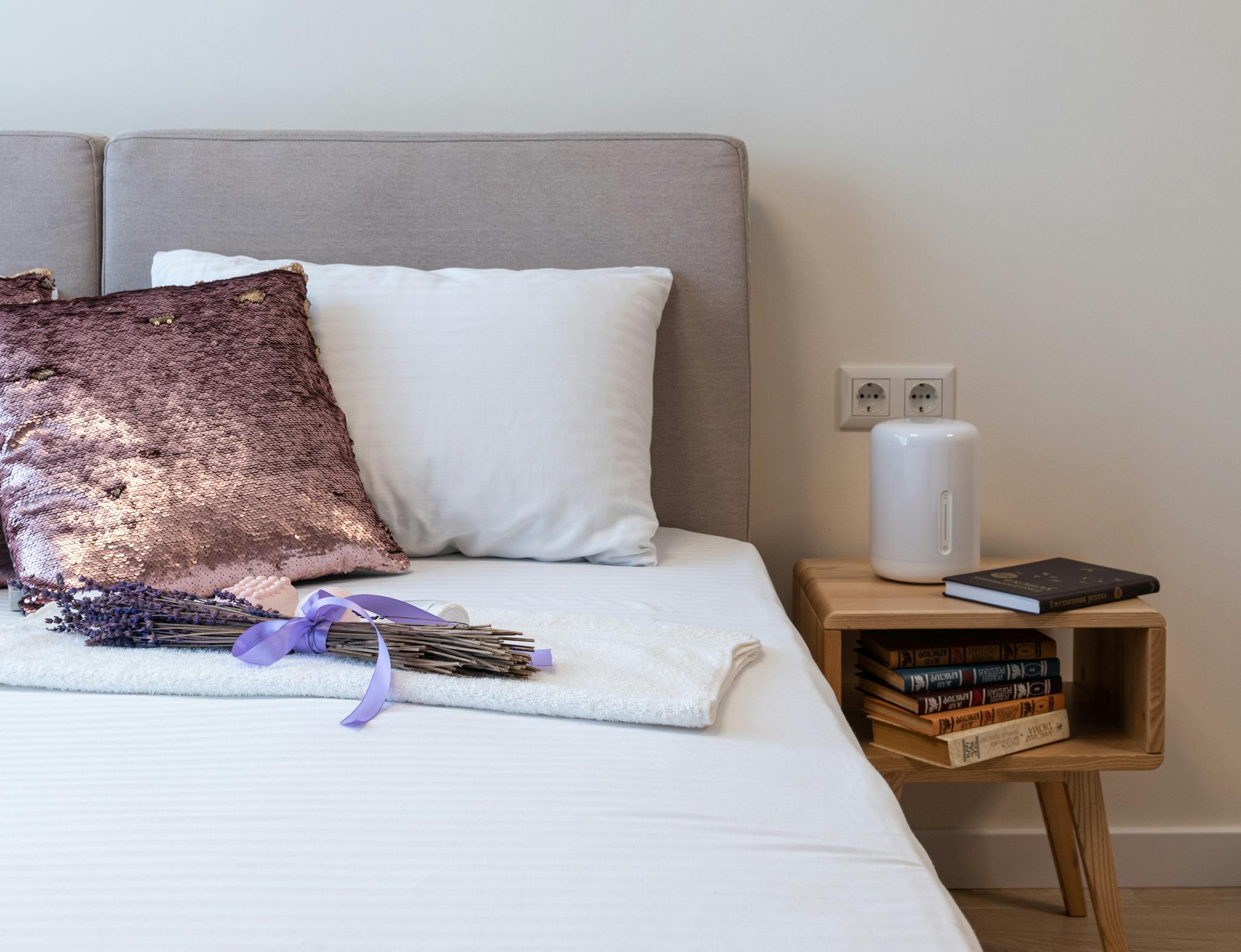The Role Of Magnesium In Promoting Restful Sleep
There are some affiliate links below, but they are all products I highly recommend. For more info, view my disclosure here.
Are you having trouble getting a good night’s sleep? Magnesium could be the answer.
Magnesium is an essential mineral that plays an important role in your body’s daily functioning, including helping to promote restful sleep.
We’ll explore the role of magnesium in promoting restful sleep, including the benefits of magnesium, foods rich in magnesium, magnesium supplements, and other sleep aids.
We’ll also discuss the other benefits of magnesium.
If you’re looking for ways to improve your sleep, read on and learn how magnesium can help.
What is Magnesium?
You may have heard about the potential health benefits of this mineral, but have you ever wondered what it is?
Magnesium is a naturally occurring mineral that is essential for a wide range of bodily functions, including nerve and muscle function, energy metabolism, and the maintenance of healthy bones. It is also an important part of many enzymatic pathways in the body, helping to regulate the activity of many of the body’s hormones and enzymes.
Magnesium is found in many foods, including leafy green vegetables, whole grains, nuts, and seeds. It can also be obtained through supplements.
The connection between magnesium and sleep is well-documented. Studies have shown that supplementing with magnesium can improve sleep quality, reduce stress and anxiety, and help regulate the body’s circadian rhythm. Magnesium also helps to relax the muscles and nerves, making it easier to get to sleep and stay asleep. In addition, research suggests that magnesium can reduce the severity of sleep disturbances, such as insomnia and sleep apnea.
The recommended daily allowance (RDA) of magnesium for adults is around 400 mg per day. However, research suggests that many people may not be getting enough magnesium from their diet. For this reason, magnesium supplements are often recommended for those looking to improve their sleep.
Note, however, that taking too much magnesium can have adverse side effects, including headaches and nausea. Therefore, it’s best to consult a doctor before taking any magnesium supplement.
Magnesium may be an important mineral for promoting restful sleep. It can help to regulate the body’s hormones, reduce stress and anxiety, and relax the muscles and nerves. Ensure that you are getting enough magnesium in your diet and, if not, to consider taking a supplement to boost your magnesium levels. However, it’s always best to consult a doctor before taking any supplement.
Benefits of Magnesium for Sleep
Struggling to get enough shut-eye? Taking magnesium may help you get the restful sleep you need.
Magnesium is an essential mineral that plays an important role in promoting healthy sleep. It helps regulate hormones, reduce inflammation, and relax the body and mind. Magnesium can even reduce stress and anxiety, further improving the quality of your sleep.
Research has shown that magnesium can help you fall asleep faster and stay asleep longer. One study found that taking a daily supplement of magnesium for eight weeks helped participants fall asleep faster, have more restful sleep, and wake up less during the night. Another study found that magnesium improved sleep quality and reduced insomnia symptoms in elderly people.
Magnesium can also help reduce symptoms of restless legs syndrome, which is characterized by a strong, uncomfortable urge to move the legs. This can be particularly disruptive to sleep. Taking magnesium supplements has been shown to reduce the symptoms of this condition, allowing people to get the restful sleep they need.
If you’re looking to improve your sleep quality, taking magnesium supplements can help. Magnesium is an essential mineral that helps reduce inflammation, regulate hormones, and reduce stress and anxiety. It can help you fall asleep faster and stay asleep longer, and can even reduce symptoms of restless legs syndrome.
Adding magnesium to your nightly routine could be the key to a great night’s sleep.

Foods Rich in Magnesium
Achieving a good night’s sleep can be as simple as adding magnesium-rich foods to your diet, such as leafy greens, nuts, and legumes. Eating magnesium-rich foods can help you get enough of the mineral to improve your sleep quality.
Leafy greens like spinach and collard greens are excellent sources of magnesium. Eating a handful of nuts like almonds, Brazil nuts, and cashews can also help you meet your daily magnesium needs. Legumes like black beans, lentils, and chickpeas are also high in magnesium, and can be added to salads, soups, or grain dishes.
In addition to the above foods, some whole grains are also high in magnesium, including quinoa, buckwheat, and brown rice. If you’re not a fan of whole grains, millet and amaranth are also good sources of magnesium.
Eating a variety of these foods can ensure that you’re getting enough magnesium to promote restful sleep. If you don’t have access to fresh vegetables and nuts, there are plenty of other ways to get your magnesium.
Tofu, for example, is a good source of magnesium and can easily be added to soups, stir-fries, or salads. Avocados are also rich in magnesium and can be used to make creamy guacamole, added to smoothies, or eaten plain.
Herbal teas like chamomile, lemon balm, and lavender are also good sources of magnesium. Drinking herbal tea before bed can help you relax and unwind, which can make it easier to drift off to sleep.
If you’re looking for ways to get more magnesium in your diet and improve your sleep quality, there are plenty of options available.
Magnesium Supplements
If you’re having a hard time getting enough magnesium-rich foods in your diet, magnesium supplements can be a great way to get the minerals you need for a good night’s sleep.
Taking magnesium supplements can help provide the body with an extra boost of magnesium to ensure it’s getting enough of this essential mineral.
Magnesium is known to help relax the muscles, and can help to improve the quality of sleep. Taking magnesium supplements can help to reduce stress and anxiety, both of which can be major obstacles to getting a good night’s sleep.
When taking magnesium supplements, it’s important to consult with a doctor or nutritionist to make sure you get the right dosage. Different people may need different dosages, so it’s important to get professional advice.
It’s important to make sure you are choosing a high-quality supplement that contains only natural ingredients, as some supplements can contain fillers and other synthetic ingredients that have the potential to cause adverse effects.
Some people may experience side effects from taking a magnesium supplement, such as nausea or upset stomach. If this happens, it’s important to adjust the dosage until the side effects subside.
People with certain medical conditions, such as kidney disease, should not take magnesium supplements without consulting their doctor.
Magnesium supplements can be a great way to get the minerals needed for a good night’s sleep, but it’s important to make sure you’re getting the right dosage and taking a high-quality supplement. With the right dosage and supplement, magnesium can help to relax the body and reduce stress and anxiety, making it easier to get a restful night’s sleep.
Magnesium and Other Sleep Aids
Gaining quality sleep is essential to your overall well-being, and taking magnesium supplements can be a great way to help you get the rest you need.
But there are other sleep aids available that can be used in addition to magnesium to promote restful sleep. Melatonin is a hormone produced by the body naturally that helps regulate your sleep cycle, and taking a melatonin supplement can help you fall asleep faster and stay asleep longer.
Valerian root is an herb that has been used for centuries to ease anxiety and help improve sleep quality. At higher doses, it has been known to help with insomnia.
Chamomile tea is another herbal remedy for insomnia, as it contains compounds that can help relax the body and promote restful sleep.
Lavender essential oil has been used to treat insomnia and other sleep issues, as it is believed to have calming and sedative effects that can help you get the restful sleep you need.
Combining magnesium supplements with one or more of these other sleep aids can be a powerful way to improve your sleep quality and get the rest you need. Talk to your doctor to find out which sleep aids are right for you and how to best use them with magnesium.
Keep in mind that any sleep aid should be used in moderation, as too much of any one of them can have negative effects on your health. Make sure to speak with your doctor before taking any supplements or herbs to ensure that they are safe to use in combination with magnesium.
With the right combination of natural sleep aids and magnesium, you can get the restful sleep you need to stay healthy and energized.
Other Benefits of Magnesium
Magnesium can’t only provide restful sleep but also plays a vital role in many other aspects of health.
For starters, it helps in the production of energy in the body and helps balance hormones.
Magnesium is also essential for proper muscle and nerve function, which can help reduce stress and improve physical performance.
It plays a role in healthy digestion, helping to break down proteins, carbohydrates, and fat in the body. This can help prevent bloating and reduce inflammation.
Magnesium is also important for mental health and cognitive function. It can help reduce anxiety and depression, and promote feelings of wellbeing.
In addition, it can enhance memory and learning, as well as increase focus and attention. Magnesium is also key for proper brain development in children and adolescents.
Studies have also found that magnesium can help reduce the risk of chronic diseases. It can help lower blood pressure, improve blood sugar levels, and reduce the risk of heart disease.
Magnesium is also known to reduce inflammation, which has been linked to many health conditions, such as arthritis and cancer.
Overall, magnesium is a vital mineral for health and wellbeing, and its many benefits go far beyond promoting restful sleep.
Incorporating it into your diet, whether through foods or supplements, can help you reap the many benefits of magnesium.
You’ve seen how magnesium can help you get a better night’s sleep. It’s important to include magnesium-rich foods in your diet and to consider taking a magnesium supplement if you’re deficient.
Combined with other sleep aids, such as melatonin, magnesium can help you get the restful sleep you need. You’ll also reap other benefits from taking magnesium, such as better heart health and improved muscle and nerve function.
So start getting more magnesium into your diet and start sleeping better today.






